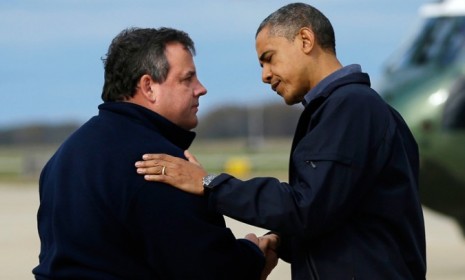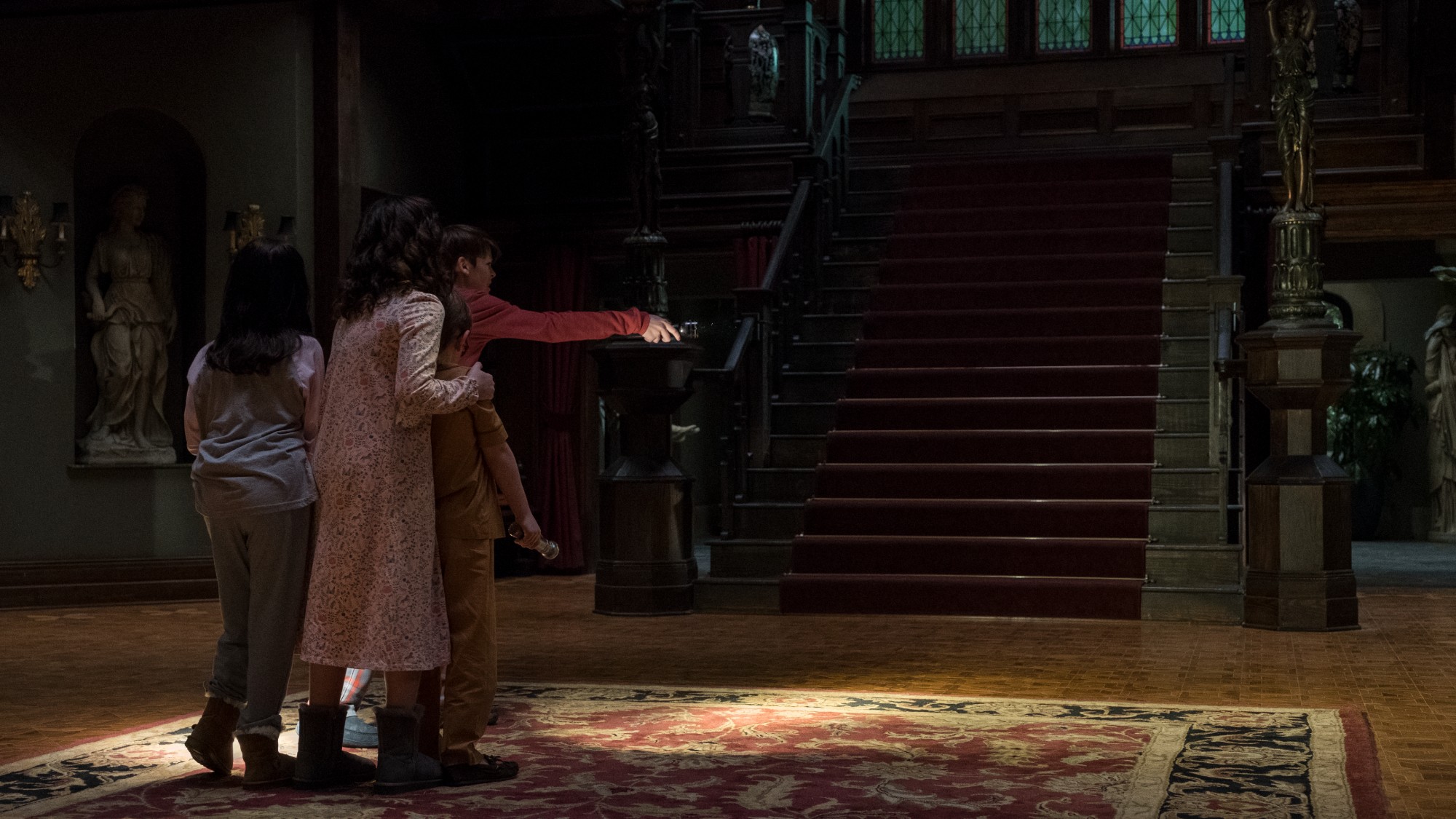Did Chris Christie destroy Mitt Romney's new message of bipartisanship?
In the final days of the race, Romney is stressing his bipartisan credentials. But Christie's embrace of President Obama is proof that Obama can work across the aisle

Mitt Romney "once delivered partisan-tinged zingers about how President Obama takes inspiration from socialist Democrats in Europe," says Michael Barbaro at The New York Times. "There are no such traces of such barbs in the dwindling days of the race," as the GOP candidate "promises to make personal outreach to the rival party a signature of a Romney presidency." The new approach appears to be paying dividends: 47 percent of voters think Romney has a better chance of breaking Congress' partisan gridlock, compared with 37 percent for Obama, according to a new Associated Press-GfK poll. David Brooks at The New York Times said Romney's flip-flopping would facilitate deal-making, while The Des Moines Register and The Orlando Sentinel both endorsed Romney, arguing that bipartisan reform would be impossible under Obama because of Republican opposition in the House.
The notion that Romney would be a more successfully bipartisan president naturally infuriates liberal commentators. Rewarding Romney for Obama's stifled attempts to reach across the aisle could set a dangerous precedent, says Ezra Klein at The Washington Post:
Obama ran for president promising to break the gridlock and overcome the partisanship that paralyzes Washington. But it wasn’t up to him. The minority won’t cooperate with the majority unless they see it’s in their interests. And the Republican minority didn’t see it that way...
The Week
Escape your echo chamber. Get the facts behind the news, plus analysis from multiple perspectives.

Sign up for The Week's Free Newsletters
From our morning news briefing to a weekly Good News Newsletter, get the best of The Week delivered directly to your inbox.
From our morning news briefing to a weekly Good News Newsletter, get the best of The Week delivered directly to your inbox.
These [newspaper] endorsements are proving Republicans right. As they show, the Republican strategy to deny the president any cooperation and make his Washington a depressing and dysfunctional place has done Obama enormous political damage. In that way, the endorsements get the situation backwards.
However, Romney's new aura of bipartisanship may have been struck a blow this week, after Republican Governor Chris Christie, a top Romney supporter, showered Obama with effusive praise for his response to Hurricane Sandy. On Wednesday, Obama and Christie toured stricken areas of New Jersey together, held joint conferences, and appeared to genuinely appreciate each other's cooperation. That visceral picture of bipartisanship, splashed across cable news channels, could hurt Romney, says Mark Halperin at TIME:
What was Mitt Romney’s closing argument? I can work across the aisle. This President has a four year record of failure, doesn’t know how to work with the other side. The symbolism of, with Chris Christie, working across the aisle, getting things done, it goes right to the heart of how Mitt Romney wanted to close this election.
Furthermore, a closer look at Romney's proposals suggests that a Romney presidency is unlikely to usher in a new era of bipartisan comity, say Jake Sherman and James Hohmann at Politico:
A free daily email with the biggest news stories of the day – and the best features from TheWeek.com
The likelihood of Romney and [Paul] Ryan locking arms with "good Democrats," as Romney put it this week, to solve the nation’s problems is dubious given the GOP nominee’s legislative priorities...
If Romney makes good on his pledge to roll back the health care overhaul — which he almost certainly must in some way given his insistent campaign rhetoric and likely pressure from conservatives — that will hardly foster the bipartisan atmosphere that Romney has recently lauded.
Repealing the law is a "red line" for most Democrats.
-
 The Week Unwrapped: What can we learn from a tool-wielding cow?
The Week Unwrapped: What can we learn from a tool-wielding cow?Podcast Plus, have we reached ‘peak billionaire’? When should troops disobey their superiors?
-
 The week’s best photos
The week’s best photosIn Pictures A bucking bull, a graveyard carnival, and more
-
 The 8 best horror series of all time
The 8 best horror series of all timethe week recommends Lost voyages, haunted houses and the best scares in television history
-
 The billionaires’ wealth tax: a catastrophe for California?
The billionaires’ wealth tax: a catastrophe for California?Talking Point Peter Thiel and Larry Page preparing to change state residency
-
 Bari Weiss’ ‘60 Minutes’ scandal is about more than one report
Bari Weiss’ ‘60 Minutes’ scandal is about more than one reportIN THE SPOTLIGHT By blocking an approved segment on a controversial prison holding US deportees in El Salvador, the editor-in-chief of CBS News has become the main story
-
 Has Zohran Mamdani shown the Democrats how to win again?
Has Zohran Mamdani shown the Democrats how to win again?Today’s Big Question New York City mayoral election touted as victory for left-wing populists but moderate centrist wins elsewhere present more complex path for Democratic Party
-
 Millions turn out for anti-Trump ‘No Kings’ rallies
Millions turn out for anti-Trump ‘No Kings’ ralliesSpeed Read An estimated 7 million people participated, 2 million more than at the first ‘No Kings’ protest in June
-
 Ghislaine Maxwell: angling for a Trump pardon
Ghislaine Maxwell: angling for a Trump pardonTalking Point Convicted sex trafficker's testimony could shed new light on president's links to Jeffrey Epstein
-
 The last words and final moments of 40 presidents
The last words and final moments of 40 presidentsThe Explainer Some are eloquent quotes worthy of the holders of the highest office in the nation, and others... aren't
-
 The JFK files: the truth at last?
The JFK files: the truth at last?In The Spotlight More than 64,000 previously classified documents relating the 1963 assassination of John F. Kennedy have been released by the Trump administration
-
 'Seriously, not literally': how should the world take Donald Trump?
'Seriously, not literally': how should the world take Donald Trump?Today's big question White House rhetoric and reality look likely to become increasingly blurred